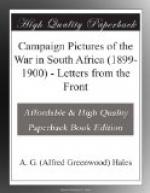I have never before attempted to express an opinion upon the future of Africa, yet now, when I have been nine months at the front, when I have marched through the Free State from border to border, noting carefully the demeanour of the people we have conquered, and the conduct of our troops towards those people, I may be allowed by the more tolerant of the British public to express an opinion. I do not see “white winged peace” brooding over this country. I see a people beaten, broken, out-generalled, and out-fought. I see a people who, even when whipped, maintain that the war has been an unholy war, brewed and bred by a few adventurers for sordid motives; and in my poor opinion there is little in front of us in South Africa but trouble and storm, unless someone with a cleaner soul than the ordinary politician remains in Africa to represent our nation. Only one man seems to me to stand out as fitted by God and nature with the high qualities which the ruler of Africa should possess. He is a man who has the gift of leadership as few men—ancient or modern—ever possessed it, a man whose word is known to be unbreakable, whose hands are clean, whose record is stainless—the Field-Marshal, Lord Roberts. The man who is to rule South Africa must be a great soldier, not a tyrant, not a martinet, not a bundle of red tape tied up with a Downing Street bow and adorned with frills. The negro trouble is looming large on the African borders, and the negro chiefs know that in Lord Roberts they have their master. We must not pander to them to the injury of the Dutch, or how are we to weld Dutch and British into a national whole? Our generals have so conducted this campaign, especially this latter part of it, that not only does the Dutchman know that we can fight, but he knows that we can be generous with the splendid generosity of a truly great people. Our generals, with few exceptions, have left that record behind them, for which a nation’s thanks are due; and few have done more than the commander of the Eighth Division, Sir Leslie Rundle, who can say that not only did he never lose an English gun, but that never did the enemy of his country succeed in breaking through his lines. Few men, placed as he was, week after week, month after month, would have been able to make so proud a boast.
These are possibly the last lines I shall ever write in connection with the Eighth Division. Their work is practically over here. My own is done, for my health is badly broken, and I shall follow this to England. But if I cannot march home with them, when they come back in triumph to receive from a grateful country the praise they have won, I can at least have the satisfaction of knowing that for many months I shared their vicissitudes, if not their glory.




